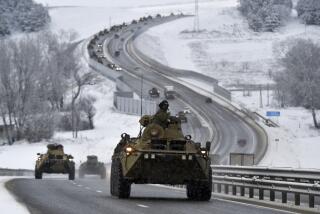Soviet Leaders Worried by Baltic âNationalistsâ
MOSCOW â The Soviet Communist Party expressed serious reservations Tuesday about the ânationalist overtonesâ it sees in the rapidly growing popular fronts seeking greater autonomy for the Baltic republics.
The party newspaper Pravda, in an assessment of the challenge posed by the Popular Front of Estonia, acknowledged that the group, formed less than six months ago, appears to have gained wider and more enthusiastic support than the party itself in the small but politically important republic.
But Pravda warned that âdemagoguesâ and opponents of socialism are active in the movement and that their bid for greater autonomy for Estonia is simply a masked demand for a restoration of its pre-1940 independence.
The Pravda analysis of political trends in Estonia is the first official expression of serious misgivings here about the growth of the popular front movement, which is spreading across the country, and about the resurgence of Baltic nationalism, which has drawn hundreds of thousands of people to recent rallies.
âAll sorts of demagogues are appearing on the scene,â Pravda said, âalong with people who are hiding behind their words about perestroika (the Soviet reform program) the venom of their hatred of everything that is socialist.â
Until now, the popular fronts in the Baltic republics of Estonia, Latvia and Lithuania, as well as similar movements in other parts of the country, have enjoyed official encouragement, or at least tolerance, for their support in mobilizing support for perestroika .
So far, Estonia has been in the vanguard of the reform effort, and the formation of the Popular Front of Estonia earlier this year not only accelerated the process locally but encouraged the establishment of similar groups elsewhere.
But now party leaders appear to be concerned about the strength and independence of the movements and about the far-reaching reforms they are seeking.
Pravda described the political situation as âhighly ambiguousâ and went on to say that âpolarization along nationalist lines is clearly visible,â with ethnic Estonians uniting against the republicâs Russian-speaking minority to demand official acceptance of their language, recognition of such national symbols as their old flag and anthem, and broad political and economic autonomy for the republic.
Yet Indrek Toome, the Estonian Communist Partyâs secretary for ideology, told the party newspaper that in view of the tremendous grass-roots support for the new movement and the considerable backing for its goals within the party itself, âwe have to cooperate with the Popular Front.â
The party similarly finds itself in an awkward alliance with the local Greens ecology movement, whose original goals of environmental protection have grown increasingly political: It has decided to nominate candidates for government bodies and put forward an âaction programâ for the republic.
Crisis of Mistrust
Worried Russian speakers, meanwhile, recently formed an organization to protect their interests, according to Pravda, and officials are now concerned about a âcrisis of mistrust.â They are working to avoid a confrontation between the predominantly Estonian groups and the Russians.
The Popular Front has backed the political, economic and social reforms proposed by Soviet leader Mikhail S. Gorbachev and has laid out plans for decentralizing political power and strengthening local governments.
Toome, the Estonian party official, declared the partyâs support for many of these goals.
But the Popular Front also wants reforms at home, including economic autonomy, Estonian citizenship that will give Estonians a status beyond that of Soviet citizens, strict limits on Russian immigration to Estonia and other measures recognizing the national status of the republic.
More to Read
Sign up for Essential California
The most important California stories and recommendations in your inbox every morning.
You may occasionally receive promotional content from the Los Angeles Times.









